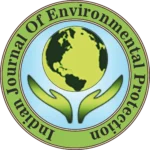IJEP 41(4): 397-402 : Vol. 41 Issue. 4 (April 2021)
Arun Kumar Yadav and Mahendra Pratap Choudhary*
Rajasthan Technical University, Department of Civil Engineering, Kota – 324 010, Rajasthan, India
Abstract
The municipal solid waste generated in urban areas is creating a severe environmental problem in absence of its proper handling and management. This paper is based on a study related to municipal solid waste management, seasonal variation in waste generation from residential households, total waste generated per day, constituents of solid waste and the potential of waste to energy in Alwar city of Rajasthan. The study has been conducted for more than one year period from May 2018 to May 2019 so as to study the effect of seasonal variation in waste generation including all the seasons of a year. The study area consisted of the whole urban area of Alwar city comprising municipal corporation boundary and it was divided into four zones for the ease of investigation. Each zone of the study area comprised of residential areas. From each zone, 30 samples were collected in a period of three months. The samples were analyzed for their composition and seasonal variation. During the study, the calorific values of the waste material have also been calculated after segregation of reusable and recyclable material and on the same way, analysis of the potential of waste to energy has been carried out. The study indicates that there is an immediate need for proper monitoring at the level of the government to take steps towards segregation, collection, transportation, treatment and disposal of solid waste as per the latest municipal solid waste (management and handling) rules, 2016. Alwar city has a good potential of waste to energy as much as 2.27 Mw and the electricity generated can be utilized either for revenue realization or for electrification in the city by the local body administration of the city.
Keywords
Municipal solid waste, Seasonal variation, Calorific value, Waste to energy
References
- Solid Waste Management Rules. 2016. Ministry of Environment, Forest and Climate Change, Govt. of India, New Delhi.
- Abbasi, M. and E.V. Ramasamy. 2002. Solid waste management with earthworms. Discovery Publishing House, New Delhi.
- Adhikari, B.K. B. and J. Martinen. 2010. Urban food waste generation challenges and opportunities in metro cities. Int. J. Env. Waste Manage., 3(1/2):4-21.
- Agrawal, G. 2001. Medical waste disposal in urban cities in India. Span., (Nov/Dec):22-26.
- Palanichamy, C. and C. Nadarajan. 2002. Municipal solid waste fuelled power generation in India. Energy Conversion, IEEE Transactions. 18:556-563.
- Schafer, B.M. 1976. Disposing of the municipal solid waste by pyrolysis process. Env. Sci. Tech., 9(2):71-78.
- CERC. 2019. Central Electricity Regulatory Commission. Available at http://www.cerc.gov.in/tariff.htm.
- Cheung, C. and K. Bengtson. 2010. Development of a renewable hybrid power generation system. Systems and information engineering design symposium. Proceedings, pp 55-60.
- Khandelwal, K.C. 1996. Harnessing wealth from wastes : An overview. Indian Renewable Energy Develop. Agency (IREDA). 8(1):5-8.
- Rao, G.K. 1998. Recycle and reuse of municipal solid waste : An economic proposition for a developing nation. India M. Env. Prot., 8(1):57-59.
- The World Bank. 2000. Municipal solid waste incineration. World Bank Technical Guidance Report.
